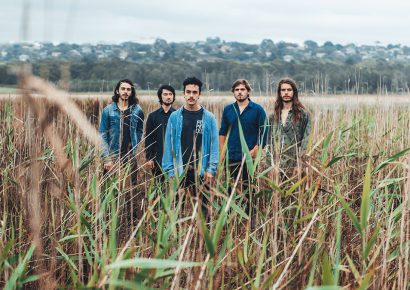“It was kind of a quick scramble,” he recalls. “All three of us were sitting in the living room with our laptops open just answering as best we could. It’s a little overwhelming, for sure, because once you’re there for around ten or fifteen minutes you start to realise there’s no way you’re going to come close to answering them all. You start cruising. Some are interesting, some you just want to leave totally alone. Some from straight-up fans who have these really whack questions you feel the need to answer. I usually [just] do Twitter, and that seems to work pretty good. There’s not a lot of obligation there, you can just rattle off whatever you’re doing at the moment. It’s not as time consuming. But we’ve always had a good relationship with fans. We’ll always talk to them at gigs, though you’re usually in a rush to get somewhere and it can be a kind of awkward thing. But that’s really how you see the faces, where you see people, not in the crowd, but as real people.”
Having formed in 1993, Low have been building that fanbase over a long time and through some significant shifts within the music industry. They’re eleven albums down with no signs of slowing, managing to not only maintain a slew of individual side projects but also oversee their own record label, Chairkicker’s Union. When asked about his own trajectory as an artist – the evolution of his songwriting, his performance chops – Sparhawk is pragmatic but thoughtful.
“We’re still essentially going in and working with really good people with really small budgets. When I first started to write, you recognise immediately that it isn’t perfect. I mean, it’s perfect in what it’s sort of … Ummm … I’m not describing very well,” he laughs. “When you write, you realise that you’re only ever given fragments. With songs you get this vast leeway where you don’t have to tell the complete story. It doesn’t have to be grammatically correct, it doesn’t have to provide the full picture. I think that’s where the fun and the art of it is, it can free you up where you think, well, I’m not going to try and use any old stuff; all that’s left is my faith in this fragment. This belief in a piece of something. It’s not until later on that you start realising, oh, that [song’s] about that, this might have been influenced by that thing going on at the time. So that incompleteness is, to me, the most exciting part about writing music.”
Nor does he prescribe to any set writing method; his composing style is as fragmented as the shards of story that weave into his interests. “I’m pretty typical mostly, I think. Sitting up late holding a guitar, usually around two in the morning. It’s usually a private, late-night thing, right at the edge of breakdown,” he laughs. “You have to be a little bit exhausted. If you get too much sleep you’re not going to write very well. I guess I [write about] the everyday. There’s maybe a few common threads throughout what we do, certain relationships and psychologies. The bones are the same. I think just at different times in your life you have a different feel for things. I definitely don’t feel like every record has a different set of subjects or themes that I’m trying to communicate. It more often feels like this is today’s version of what I’m trying to say.”
This raises the question, then, of how happily Sparhawk can reflect on earlier recordings when each song might be considered a testament to one particular time and place. Their latest album, Ones and Sixes, was released September 11, and though still very fresh, you wonder if the intent and meaning behind the record still resonates with the band. “It’s worse, because we finished it last winter, so it sat there for five or six months before anyone started to hear anything. So we had to sit with it for a while, which takes some of the wind out of your sails. When you finish it, you’re the most excited you can be. I don’t know. You gain a little perspective, but there isn’t some magical moment where you suddenly say, ‘Oh, OK, I understand what I’ve been doing now all this time.’ It’s all about those little fragments. Sometimes you can look back and see, well, that part must come from there, things like that. I’m not adamant that I understand what I’m doing necessarily, so I’m not too concerned with figuring out whatever it is I’ve done. If it felt right, if it felt like it was an accurate representation of the parts I know are there, then that’s kind of all the satisfaction you can ask for.”
Ones and Sixes is out now via Sub Pop / Inertia.

